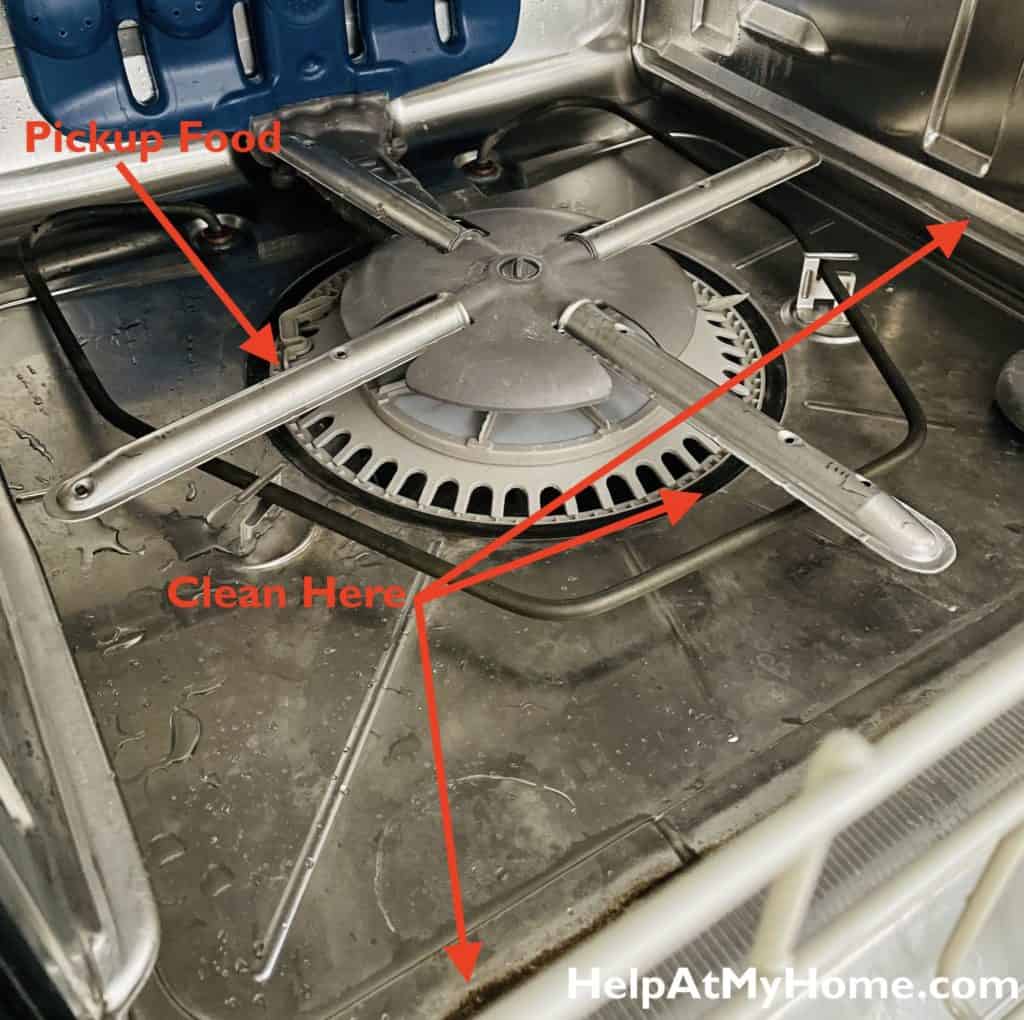Dishwashers are supposed to make our lives easier, so when they run but then give us cloudy glasses, oily plates, and dirty spoons, it’s quite a disappointment.
The good news is that this is a fixable problem. You just need to take a few steps in order to clean out your dishwasher and then take a few preventative measures in the future.
What Makes Dishware Cloudy?
Typically speaking, cloudy dishes post-wash can be due to a few factors, most of which are easy to diagnose. These include:
- Some sort of fat in the dishwasher (a spoon covered in peanut butter for instance)
- Debris and gunk build up
- Clogged drain
- Hard water (and the associated build up)
Each of these can lead to cloudy dishes, but each will have a slightly different effect on the plates, glasses and silverware, and it might take you some time to learn the difference between each. You can visually inspect the inside of the dishwasher or venture a guess at the culprit though.
How To Clean The Inside Of A Dishwasher
I find that the best thing to do is follow the following steps…
First if all, empty out all the plates and anything else in the dishwasher. Get down low and look around the bottom and corners of the basin for any stuck food, silverware, or any collected gunk. Remove the food, recover that missing teaspoon, and then wipe down any collected grime or gunk.
From down low, with a flashlight, you might see that the inside of the dishwasher is pretty dirty. This will be worse with dishwashers with plastic interiors than with stainless steel ones, as the plastic is more likely to have things cling to it.
You’ll want to spray down the whole inside with white vinegar, including the spray heads, and corners, and let it sit for 15 minutes and then give the machine a good wipe down. Don’t miss the hinge at the bottom or anywhere else where you say water collect because this is where gunk can collect as well. The full length of the hinge is often the worst area as water and food can pool here.

A Deeper Clean
If a simple spray and wipe isn’t enough, a good method is to empty the dishwasher and then pour about half a gallon of white vinegar inside. Now run the vinegar cycle, with no soap, on the longest, hottest setting. Turn on steam clean, heated dry, sanitary clean mode, and all those other things that make the cycle really long.
With this wash the vinegar will clean off any hard water and collected fat deposits, etc. and the extended cycle well serve as a self-cleaning mode, much like you’d see in an oven.
Last Resort
If you need to upgrade your cleaning power, then you can get Affresh Dishwasher cleaning tablets. This is a citric acid cleaner that is more powerful than white vinegar, but serves the same purpose. It is less person-friendly, so make sure you wear gloves while handling it and keep it away from children.
A single Affresh cycle can make a big difference — really removing hard water deposits as well as any lingering smell inside the machine. Affresh isn’t a replacement for periodic cleans, but it can really keeping the inside of the dishwasher in sparkling condition when used periodically.
Clean And Cloud-Free
A clean dishwasher will produce cloud-free, sparking dishes… there isn’t much else to it. Hard water won’t necessarily mean your dishes are “dirty” but they will appear to be unclean and the inside of your dishwasher won’t look great either, as calcium and other minerals will collect and make the dishwasher look decrepit.
Light, but regular cleaning will go a long way in keeping your dishwasher effective and ensuring it lasts for its full lifespan.
FAQs
Can I use a tablespoon of bleach to clean out my dishwasher?
Many people use bleach to clean their dishwasher, but this isn’t recommended. Bleach is not acidic, so it won’t do anything to help with hard water or mineral deposits (like lime scale). Bleach also is harsh liquid that can harm the inside of the dishwasher, especially if touches anything while concentrated. Vinegar is a better home remedy
Do I need Jet Dry or a similar dishwasher rinse aid?
No, Jet Dry is not necessary for a clean dishwasher or clean dishes and silverware. Jet Dry will help ensure that your dishes come out of the cycles drier and cleaner than they would otherwise be, but it’s just an aid, not a replacement for a clean dishwasher or detergent. The main advantage of Jet Dry is that it’s added to the dishwasher cycle at just the right time for maximum benefit. The make-up of the liquid makes it more effective than adding vinegar at the point in the cycle as well, but the overall benefit isn’t huge.
